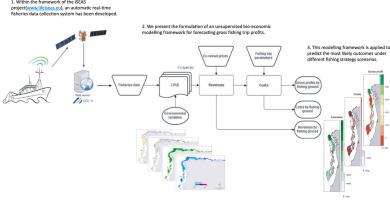Marine Policy ( IF 4.315 ) Pub Date : 2021-04-11 , DOI: 10.1016/j.marpol.2021.104499 Raul Vilela , Maria Grazia Pennino , Gonzalo Rodriguez-Rodriguez , Hugo M. Ballesteros , Jose Maria Bellido

|
The current European Union has been progressively implementing since January 2014 a discard ban which includes the obligation to land unwanted catch for certain regulated species and sizes. Although a full enforcement of the landing obligation has a direct impact on discard reduction through more responsible and selective fishing, fishers argue that it will prompt both a decrease in incomes and an increase in working time onboard. Thus, the measure is in a hold in south-western waters due to the difficulties to implement the ban in mixed fisheries This paper analyzes some possible scenarios which fishers could face under the landing obligation. It is shown the construction of a spatial bio-economic model to infer average costs, incomes and gross profits by fishing ground. We illustrate its use using a coastal trawling fleet based in the northwestern Iberian Peninsula as case study. Results show how fishing ground selection will remain the key factor affecting gross profits, well above the selection of closer fishing grounds, the improvement of fuel efficiency, or extending the length of the fishing trip. Increasing the number of crew members to overcome the expected excess of work time onboard would also be a cost-benefit balanced measure. According to our scenario simulations, to maintain business-as-usual (status quo situation) is the most probable fishing strategy without any regulation change. Fishing strategies are tight and maximized to current economic outcomes. Fishers will be reluctant to change their own fishing unless they are forced to for economic and/or regulatory reasons.
中文翻译:

使用经济效率的空间模型来预测不同捕捞策略情景下最可能的结果
自2014年1月以来,当前的欧盟一直在逐步实施一项丢弃禁令,其中包括有义务对某些受管制物种和大小的有害捕捞物降落。尽管全面执行着陆义务通过更负责任和更有选择性的捕捞对减少丢弃物有直接影响,但渔民认为这将导致收入减少和船上工作时间增加。因此,由于难以在混合渔业中实施该禁令,该措施在西南水域处于搁置状态。本文分析了渔民在着陆义务下可能面临的一些可能情况。它显示了构建空间生物经济模型以推断渔场的平均成本,收入和毛利的方法。我们以伊比利亚半岛西北部的一个沿海拖网船队为例,说明了它的使用。结果表明,渔场的选择将如何仍然是影响毛利润的关键因素,远高于选择近距离的渔场,提高燃油效率或延长捕鱼行程的时间。增加机组人员的数量以克服预期的机上工作时间过长也将是一项成本效益平衡的措施。根据我们的情景模拟,在不进行任何法规更改的情况下,维持照常营业(现状)是最可能的捕捞策略。捕捞策略是严格的,并且要根据当前的经济成果进行最大化。除非出于经济和/或监管原因而被迫捕捞,否则渔民将不愿改变自己的捕捞方式。


























 京公网安备 11010802027423号
京公网安备 11010802027423号